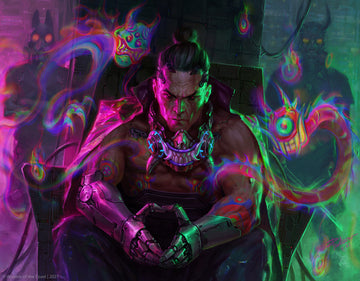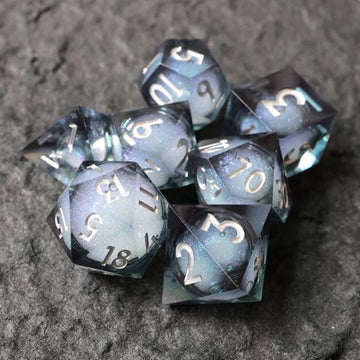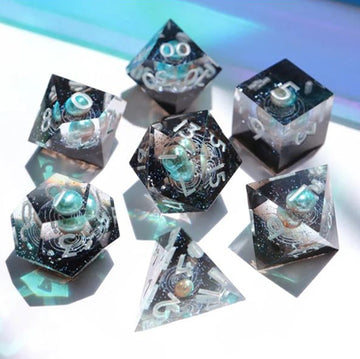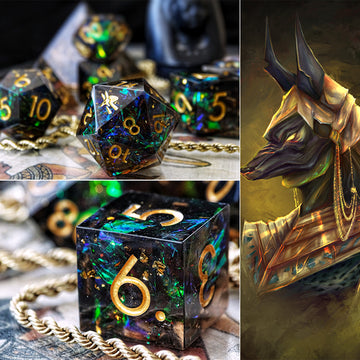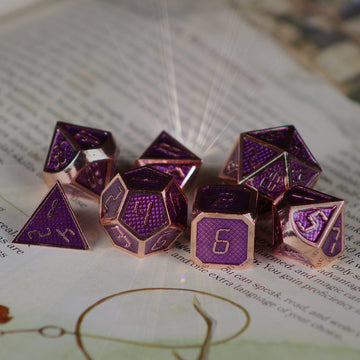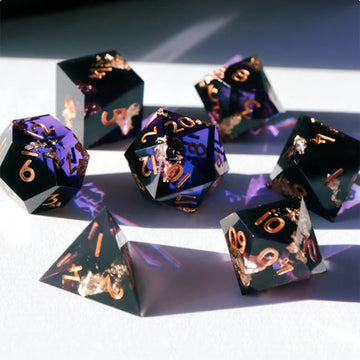Image by Anna Pavleeva © Wizards of the Coast
Choose a Flaw to Impact How You Role-Play Your TTRPG Player Adventurer
By Scott at Black Citadel
Edited by Riley Rath at Riley James Copy
Building a new character in Dungeons and Dragons is beyond just fun, it's essential if you want to sit down and play a game! Whether you're a DM whipping up an NPC villain or a player dreaming of their next adventurer, creating a personality for your character is incredibly important. I mean, after all, this is a role-playing game!
It can be tempting to make your new hero some paragon of truth, justice, and honesty, but let's be real here. That sort of "Mary Sue" perfect character will get stale before level 3. Often, it can be difficult to actually maintain that image when your character is met with tough situations.
So, today we're going to be talking about character flaws and how to work them into your next PC. In this article, we'll not only be giving you 12 amazing flaws, but we'll also nail down what exactly a flaw is so you can come up with one that's perfect for you.
Table of Contents
- What are DnD Character Flaws?
- Can DnD Character Flaws Affect Gameplay?
- DnD 5e Flaws List: 12 Ideas for Your Next Character
1. Drunkard
2. Ruthless
3. Gossip
4. Obsessive
5. Untrusting
6. Repressed
7. Know-It-All
8. Avarice
9. Claustrophobic
10. Promiscuous
11. Zealot
12. Perfectionist
- Conclusion: Adding Your Flaw to Your Backstory
What are DnD Character Flaws?
A flaw is the part of a character that is immoral, weak, underdeveloped, or in some way errant. They are shortcomings in their personality that are expressed in a person's actions, feelings, and thoughts. They have prevented them from being a hero in the past.
Which begs the question: "if these flaws prevent them from being a hero, why have them at all?"
Because the core of the hero's journey is showing character growth: how they OVERCOME any flaws within themselves.
One thing that makes classic, heroic stories so interesting is the change we see in a person throughout the journey .More often than not, characters discover the ugly sides of themselves, aspects they may have always repressed, ignored, or feared. These "shadows" within them have prevented them from thriving in life, and only until they confront them and deal with them can a character truly reach their potential.
DnD character flaws are also important just for "likability" reasons; flaws make adventurers believable by adding real emotional depth. In my personal opinion, flaws are the number one thing that makes characters believable instead of cartoonishly heroic. Just look at the successful superhero films we have today. There's not a single character, even Superman, who is without some sort of flaw!
In fact, it is so important that there is a specific space for it on your character sheet (here is a guide on filling one out on your own!). Every "Background" in the Player's Handbook and other official 5e material includes flaws. They are an essential part of any adventurer.
DnD flaws are important for storytelling and character development.
When building a character in D&D, it's important to figure out why they are flawed. We want a backstory that supports a certain viewpoint, fear, or vice. And you have A LOT of choices at your disposal. These aren't minor flaws, like having weird quirks or a bad habit like biting your nails. Flaws vary; they can be anything from an irrational fear to a corrupted world view. Either way, these are generally bad things that keep your character from being "perfect."
Let's quickly nail down some of the categories before we go any further.
- Fear - Something your character is afraid of. This ranges from acute fears like darkness or heights to more general fears like the fear of loss.
- Viewpoint - The way a character perceives things is likely to be impacted by elements of their backstory. They might view everyone as a threat after their time in a war, or they might view themselves as always right because of how they were raised.
- Weakness - We're not talking about a lack of strength score here. Instead, weakness refers to areas where our hero struggles. They might be unable to say no to a pretty face, or they might have an inability to trust others.
- Vice - One of the easiest flaws to play is a vice. These are areas like smoking, drinking, or gambling that your character is compelled to partake in, regardless of the circumstances.
There can definitely be some overlap between these in any individual flaw. Still, these categories can help us to decide what kind of flaw we will use for our character and, more broadly, what kind of character we'll end up with.
Can DnD Character Flaws Affect Gameplay?
Now this might seem like a silly question. After all, these flaws have ZERO mechanical benefits. There are no spells, attacks, skills, or saving throws that will be impacted by whatever you choose from our DnD 5e flaws list.
That said...
There is nothing stopping you from including it all throughout your gameplay!
DnD character flaws can impact all your decisions as a character. If you are wrathful, maybe you struggle to use effective tactics in combat encounters. If you are greedy, maybe you continue to haggle with store owners, even though it always drives up the price. And if you are selfish, maybe overtime you begin to feel alienated within the party.
Of course, run this by your Dungeon Master first. It is easy to become very obsessed with our own characters and forget that they share the spotlight with the rest of the party. And every other player at the table also consciously/subconsciously thinks THEIR adventurer is the center of the story. You want to make sure your character development isn't getting in the way of everyone having fun. Whatever your adventurer is going through, you don't want to step on other's toes.
DnD 5e Flaws List: 12 Ideas for Your Next Dungeons and Dragon's Character
We've put together a list of 12 DnD character flaws that will quickly allow you to have a fully fleshed-out adventurer. Keep in mind that with any of these flaws, you should be sure not to let them exist in a vacuum. Incorporate them into your backstory as needed and you'll have a well-built character in no time.
Feel free to read through the descriptions of each of these flaws to decide which is most appealing for you.
Of course, if you want to have some fun with it, you can always grab a d12 from Awesome Dice and roll on the table below. I'm a particular fan of the Nebula Nocturnal and Oceanic series or this Lustrous Shadow Set, but pick whatever suits your fancy, and let the fates decide on your next character flaw.
Drunkard
The drunkard doesn't drink to unwind; the drunkard drinks to get drunk. Most nights in a tavern will end with them spending more money than they have, getting in a fight or two, and blacking out somewhere other than their bed.
Alcoholics often have a lot of trauma, and this character might be drinking to cover up that trauma. They might be a soldier who has seen hundreds of innocents die, or they might have been beaten as a child.
Whatever the source, they aren't likely to open up about it. They are, however, very likely to cause trouble if drinks are around.
Ruthless
Someone that doesn't hold themselves back is dangerous to have around. Justifying your actions based on the actions of another is a slippery slope and can end in some pretty horrible instances of the ends justifying the means.
This character is one who will get progressively more violent and desperate, often to a point of undergoing an alignment change. If they don't have a change of heart or see the error in their ways, we may be looking at the creation of a villain here.
Gossip
A loud mouth can get your party into some unfortunate situations. This flaw goes beyond just telling secrets. Eventually, it turns into a complete lack of filter. An expert spy or thief rogue may be full of secrets, but those are worthless if they have a compulsion to share them whenever they can!
In social scenarios, a whole third of the game, saying the right thing at the right time is incredibly important. If this character's not kept in check, they could get the party a one-way ticket to a prison cell or worse.

© Demonui
Obsessive
I chose to hone in on the obsession of knowledge because I think people are often afraid of giving intellectual characters any real flaws. This works well, allowing them to have an admirable goal that is corrupted by their obsession over it.
Knowledge is great, but if you're willing to make sacrifices for it, when will it end? At what point is this character no better than the ruthless character? These are all questions to ask as you figure out what kind of person your academic really is. Are they so bent on knowledge and power that they will do anything, or can they find limits that are too far for them to pass?
Or... in a less serious direction, they could simply be obsessive over their appearance or surroundings. Perhaps they have a phobia of spiders and will REFUSE to stay in any tavern that does not have a five star rating.
Untrusting
An untrusting character played poorly can be incredibly annoying to have at the table. Those often go against the face of improv, denying others every idea they come up with because "I only trust myself."
Played well though, this can be an absolutely amazing character. Their inability to trust is still a hindrance, but it is one that adds value to the story and experience.
To really make an interesting character with trust issues, you need a good backstory centered on betrayal. As you play the character, they can still work well with others, but they will always have an out, a way to change control of the scenario if they get even a hint of deception.
Repressed
Ironically, an emotionally repressed character creates one of the most emotionally packed experiences for the player. With most characters, you don't consider the emotional impacts of your actions. Of all the DnD character flaws, this one takes the longest to reveal as problematic and will require a longer campaign.
With this one though, you have to think about how they want to react so that you can figure out how they would hide that reaction. It fosters more emotional connection to the story around the table, and lets you have the heartwarming moment when this character finally opens up.
Know-It-All
To play a know-it-all right (speaking from experience), you have to make your character believe that the other characters in the party don't know everything. The know-it-all's insistence on other characters' lack of knowledge makes it so much more frustrating for other characters when the know-it-all tries to correct them.
This creates an argumentative character but one that is far more interested in the conversation than the result. A true know-it-all will accept when they were wrong, but they just might twist it to sound like they were the ones to come up with the idea in the first place.

Image by Izzy © Hasbro
Avarice
Greed is the downfall of many a great adventurer. Someone who can be bought is someone who can easily make the immoral move more often than not. Most of these characters start off with one or two things they absolutely will not do, and therein lies the fun. When offered an incredible amount of money to commit such an act, how will they react?
Greedy characters also tend to be the ones who spend the most money, so you can be sure this character will have more than a few liquidable assets lying around at any given time. And keep in mind, avarice has traditionally included much more than money; your wizard can be consumed by greed for knowledge, refusing to share arcane secrets with anyone, including those they love!
Claustrophobic
There might not be anything further from a D&D hero than a character who's afraid of confined spaces. Still, it's perfectly reasonable and makes for some funny scenarios. Imagine a big barbarian suddenly muttering to himself "just take a deep breath" as he hunches over in a dark cave.
They're probably aware of the irrationality of their fear. At the very least, they'll go into dungeons and caves despite themselves. It's the way they act once they're in there that can create both comedy and tension.
The best bit of this character is the rare occasion where they get to yell, "I told you so!" at the rest of the party.
Promiscuous
Promiscuity is easy to play and can feel a lot like a drunkard with a different vice. Fortunately, promiscuity can have some more longer-lasting repercussions, like bastard children running around. This is the stereotypical vice of DnD bards, although in my experience GM's rarely have them face the consequences (if you want an out-of-the-ordinary bard, check out our bard ideas post!).
This charismatic sort of character can often become very sleazy, and it's tough to get them moving if they've set their eyes on a pretty face. Add in the moral repercussions, and you get to immerse yourself in a character with a very interesting story.

Zealot
You can have zealots who aren't religious, but centering the character's passion on a god is easy. At the core, this is a character who believes firmly in a specific viewpoint they were taught. This can be a cleric that INSISTS that their deity is superior to all others, or a Paladin that believes only THEIR monarch is just, or a Druid that despises anything crafted by humanoid hands.
They might laugh at those who disagree with them, or they might wish them dead. How you play this can lead to a wide variety of different characters, but all of them will have an air of arrogance to them that can make them more than unbearable at times. Of all the DnD character flaws, this can run you into the most trouble with other party members who will have different worldviews than your adventurer.
Perfectionist
Perfectionism can be an asset at times, but these characters get violent when things don't go their way. It might be directed inwardly, but even then, they may be too busy beating themselves up to learn any lessons.
Perfectionists also tend to be controlling, so don't be surprised if this character pushes for their way more than the know-it-all does.
Conclusion: Adding Your Flaw to Your Backstory
There are many more DnD character flaws not found on this list. You can pick whichever you want, but it's important that whatever you pick fits with the rest of the character traits you choose. Which is why it is good to create a compelling backstory to explain HOW your character became the way they are.
So ask yourself: how did they become this way? What happened to them and when? How have they tried to manage their flaw, or why have they never dealt with it? What other aspects of their personality were formed because of this flaw? And is it compelling them to go on an adventure?
For some players, working through their character's flaws can even be a sort of active therapy. For others, these are a way to distinguish your version of a premade D&D character from someone else's. For others still, flaws are what keep your character grounded in reality. After all, we ourselves are flawed, so why should our fantasy characters be some unachievable goal of perfection?
And, of course, A LOT is going to happen to your character throughout the campaign, creating opportunities for new flaws to develop!
Whatever the case, I hope you've enjoyed this article and are ready to get rolling with the new character you've put together. As always, happy adventuring.
This article was written by our friend Scott at Black Citadel. Be sure to head over and give some of Black Citadel's other articles a read. They have great resources for players and DMs alike!
Editing, and an additional passage or two, was provided by Riley Rath of Riley James Copy. Visit his site if you need board game marketing and copywriting.


